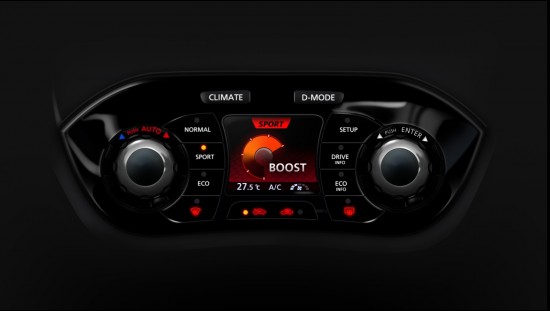The Juke was designed at Nissan Design Europe in London and refined at Nissan's Design Centre in Japan. It is based on the Nissan B platform. The car's profile is dominated by the prominent wheel arches and the body's high waistline, which combine to give an impression of strength and which contrast with the slim side windows. Echoing a style first seen on the Maxima, Nissan's high performance electric coupé concept shown at the 2007 Frankfurt Auto Show, the glasshouse resembles a crash helmet visor. A coupé-like appearance is achieved by the rear door handles being located near the C-pillars, within the window frame. The sport motif continues inside with the red- or grey-painted centre console bearing similarity to a motorcycle fuel tank. The front end features a stacked array of lights. Running lamps and indicators are mounted atop the front wings, their lenses visible from inside the cabin as an aid to manoeuvring. Below them, under the lower edges of an expansive, curved grille, the main headlamps are intended to be reminiscent of those fitted to rally cars during the 1960s and 1970s. Where fitted, fog lamps are situated on a third level within the sump guard at the bottom. Common to all but base models is Nissan's Integrated Control System, dubbed I-CON: a command module that sits in the lower dashboard, which manages both the climate control and the vehicle's drive mode (Normal, Sport or Eco). Its display and nomenclature change according to the function selected.
|
|
|---|
Monday, July 18, 2011
Subscribe to:
Post Comments (Atom)



















No comments:
Post a Comment